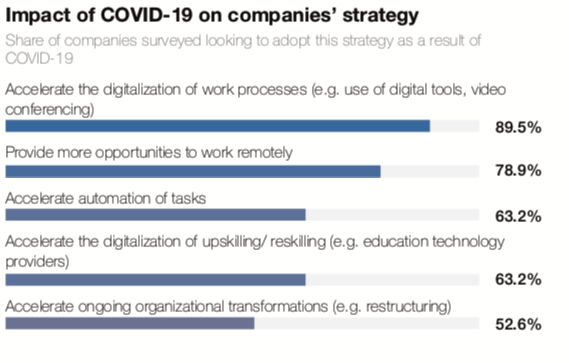November 4, 2020
COVID and the Future of Workers (Hunsley)
By Terrance Hunsley

Lots of organizations are exploring the future of work. The OECD. The World Economic Forum. The ILO. Polling firms, Consulting companies. Magazines. And think tanks including the Pearson Centre, whose report I wrote just before the pandemic hit us.
They all start off the same, as expressed by the ILO: The world of work is experiencing transformative change, driven by technological innovations, demographic shifts, climate change and globalization.
They all talk about jobs being automated, and the need for better faster training, especially in tech-savvy jobs, in career entrepreneurship, and in interpersonal and leadership skills.
And now there is COVID. COVID is accelerating the changes taking place in work opportunities and arrangements. Remote work and remote education are the leading edge. The home and family are becoming a new form of enterprise, even when employment continues without disruption. Job disruption and work-replacing technology are accelerating in both vulnerable and expanding businesses.
All employers are taking a new look at their workforce and are thinking of change. The World Economic Forum survey of Canadian companies showed that most companies intend to accelerate their plans for workforce change: (http://www3.weforum.org/docs/WEF_Future_of_Jobs_2020.pdf).

A Conference Board study revealed similarly that more than half of Canadian employers are accelerating their adoption of new technology.(www.conferenceboard.ca)
According to Statistics Canada, many of the companies that are increasing their use of robot technology appear to also be companies that are rapidly expanding, so that they are also expanding the number of employees. What is unknown is whether the expansion of new jobs is reduced by the automation technology. (https://www.cbc.ca/news/business/robot-workers-statscan-1.5786528)
More or fewer jobs and who gets the good ones?
All studies point out that disruptive economic waves in the past have created more jobs than they destroyed. This time could be different. This revolution provides technology to replace workers. And for the rich countries, it takes place in a slow-growing population. When the population is expanding, new children demand product and services, and markets expand. Not now. The IMF predicts very sluggish growth in Canada and most of the OECD countries.
After NAFTA and the globalization disruption, we replaced some of the lost production jobs with well-paying tech, marketing, and specialist jobs. We increased the jobs available in transport, distribution and retail. And we explanded some services, like massage therapy, para-health professions and postsecondary education and training. But many of the displaced people went into low-paying service jobs, resulting in Canada having a greater percentage of low wage workers than most of the other rich countries.
So as COVID restrictions are eased and government subsidies withdrawn, we could be looking at a high and rising level of unemployment, part-time and insecure employment.
While the response of governments to the pandemic is admirable, the need for courageous intervention to support workers for an extended transition will be large. And unfortunately there will be political and economic forces suggesting that the way to keep more jobs open will be to keep wages low. This could amplify the recent trends in inequality and development of a two-tier work force, and subsidize uncompetitive businesses.
The ILO, with its concern for workers, has issued a declaration calling for a
“human-centred approach.” It focuses on three areas of action:
- Increasing investment in people’s capabilities
- Increasing investment in the institutions of work
- Increasing investment in decent and sustainable work
Good thoughts, but if the economy does not produce enough work to give everyone a chance to earn a decent living income, then something has to be done. In Canada, organized labour has no real power beyond the public sector.
That leaves government, and governments have a strong bias toward a “do nothing and hope for the best” scenario. After all, the final tallies won’t be evident for some time, and mistakes of commission are more evident and easily traced than mistakes of omission.
In my Pearson Centre report, Future of Work Policies for the 2020’s, I make a series of recommendations for governments. Looking them over in the context of COVID, I believe that they are even more needed, and as soon as possible.
The following policy recommendations are presented, mostly to secure economic opportunity for workers in the future:
Education and Skills Development:
1. Implement the recommendations of the Economic Strategy Tables and Growth Council for a $15B/year increase in spending on adult training. This should be the minimum increase, given that Canada invests less than other countries at present in this area.
2. Eliminate the lifetime limits on loan and grant support for personal investment in education and training. We should retain the requirement to repay student and training loans, but with graduated forgiveness with ongoing tax contributions.
Working conditions, wages and reducing inequality
3. Establish Work-Business Sector Councils with business and worker representation, to monitor working and business conditions in each economic sector and recommend appropriate wage scales. This may include recommending reduced working time (weekly or yearly hours) if necessary to share reduced need for workers.
4. Adjust the combination of minimum wages and the Canada Workers’ Benefit to bring low wage income above the OECD-defined threshold of 2/3 of median income.
5. Implement a Basic Income to rebalance and stabilize the bottom half of the income ladder with a share at least 30% of national income (currently 27%) based on equivalized disposable income, and to provide a base for people to make necessary adjustments in their work and life plans.
Pensions
6. Establish a Workers’ Retirement Savings Option to invest RRSP’s in the CPP Investment Fund.
Transparency and Accountability
7. Expand the CRA personal taxpayer account in order to allow Canadians to see a comprehensive real time report on their financial relationship with the government. They could see government contributions, credits, benefits received, debt to government, and prorated value of major public services such as health and education.
Tax Reform
8. Increase taxation of capital, beginning with a progressive tax on estates, elimination of the preferential rate for capital gains, and effective taxes on international businesses that are active in Canada.
Enhancing urban governance
9. Convene a Commission to consider increasing the power of cities in areas of environmental regulation, quality of life, and working conditions (such as minimum wages).
I invite readers to take another look at the report to see the background analysis and supporting detail for these recommendations.
(https://socialcanada.org/2020/09/20/future-of-work-policies-for-the-2020s-reposted/)(or on this site under Dialogue/Progressive Podium).
When the federal government prorogued the House a few months ago, they suggested that the new session would see a bold new set of policy initiatives. We haven’t seen them yet, and the time for bold government action is now.
Terrance Hunsley is a Senior Fellow of the Pearson Centre and editor of SocialCanada.org. He is a former CEO of the Canadian Council on Social Development and the International Centre for Prevention of Crime, and Fellow of the Queens School of Policy Studies.
Play a Role in Shaping Canada’s Future
Together, let’s build a dynamic voice for progressive policy in Canada.
What’s New
Current Initiatives

The Canadian Flag
What are Your Thoughts About the Canadian Flag? Invitation to a National Conversation
Send us your thoughts in words, pictures or videos. What do you feel the flag stands for and what does it mean to you? Keep the words to under 150 and the videos to under 60 seconds and we'll post them. The only requirements are that you be respectful and you post in English or French so they can have the widest reach.
Please send them to: Flag Project Coordinator, Pearson Centre: info@thepearsoncentre.ca
Learn more.

New Members of Parliament
New Members of Parliament share their thoughts and plans for the upcoming year.
Learn more.
Progressive Podium
An innovative series of policy proposals that are bold, progressive, innovative and future-focused.
Learn more.